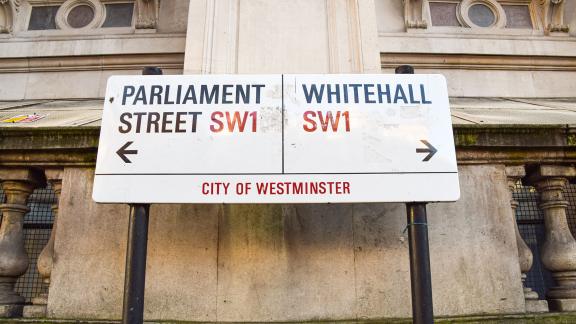Health and care bill: joint parliamentary briefing

Background
The NHS Confederation, NHS Providers and The King’s Fund support the premise of the Health and Care Bill, and believe that the future of health and care in the England must be based on collaboration and partnership working at a local level.
We do, however, share a number of key concerns regarding the Bill. This joint briefing covers two specifics aspects of the Health and Care Bill and amendments we believe would better ensure people across the country has access to the best possible care in their local community.
If you would like to have a further briefing from us, or if you plan to speak in the debate, please do get on touch with Caitlin Plunkett-Reilly, external affairs manager (public affairs).
General Power to direct NHS England (Clause 39)
These powers open up the possibility of ministers’ involvement in aspects of the operational management of the health service. We are concerned that without appropriate safeguards in place, decisions might not be properly focused on the best interests of services and populations. Those concerns were echoed by the Lords Constitution committee report on the Bill published in January which stated that these new powers
...could alter the balance between the Government’s constitutional responsibility for the provision of health care and providers’ ability to function in a manner that can respond effectively to local needs
Clinical and operational independence must be maintained in order to ensure equity for patients within the service; the best use of constrained funding; and clinical leadership with regard to prioritisation and patient care. While the intention may be to deploy these powers on rare occasions, the breadth of the powers as currently drafted is so great that safeguards must be put in place. We welcome the decision to add a duty to publish any direction given to NHS England, but believe additional safeguards are needed to protect the NHS’s independence. These safeguards include:
- The need for full and timely transparency when the power is exercised – we believe this should include the need for the Secretary of State to set out why their use of the power of direction, on each occasion, meets an objectively defined public interest test before giving a direction. The Secretary of State should also publish any direction together with an impact assessment at the time that the direction is issued and lay it before Parliament.
- The addition of further exceptions to the use of these powers, including removal of the powers to direct procurement decisions, the granting of NHS funds, local NHS operational decisions, and the fair share allocations to local systems.
A lack of safeguards could arguably expose the government, any Secretary of State, the service, and patient care to undue, unmanaged risk.
Our ask
We urge Peers to support the amendments –174A, 174B, 175A and 176A on the marshalled list of amendments in the name of Lord Hunt of Kings Heath:
- Amendment 174A would mean that a direction by the Secretary of State may be given only in relation to a particular instance, not generally, and that a direction must provide for the direction to cease to have effect on a date specified in the direction, which must be no later than one year from the date the direction was given.
- Amendment 174B would mean that a direction must include in the statement the reasons why the Secretary of State believes the direction will be in the best interests of the public. The statement will include what other options have been considered, including the option of not giving a direction and will provide a justification for the option chosen.
- Amendment 175A would mean that the Secretary of State must publish any direction at the time that the direction is issued and lay it before Parliament. Additionally, the Secretary of State must publish an impact assessment at the time the direction is issued or within that financial year. The Secretary of State would also be required to commission and publish an assessment of the impact of the totality of directions given each calendar year.
- Amendment 176A would mean that the power could not be used to direct NHS England to make a particular procurement decision or a grant of NHS funds to a particular person. This amendment would also mean that the power could not be used to undermine the integrity of fair share allocations to local systems, by unfairly seeking to amend allocations to a particular part of the country, contrary to the allocation formula. Ministers will of course still be able to issue guidance to the Advisory Committee on Resource Allocation about the overall formula. In addition, this amendment would mean that the power could not be used to seek to intervene in local NHS operational decisions.
Local reconfigurations (Clause 40, Schedule 6)
We are concerned about the unchecked new powers for the Secretary of State to intervene at any stage of a local service reconfiguration, with no minimum set of information requirements on which to base such a decision.
The Government’s own impact assessment says that interventions in local reconfigurations by Secretary of State could increase costs to local healthcare systems by slowing down the process. It also flags:
What constitutes a service change that merits, or not, ministerial attention can be subjective, and might change as reconfiguration proposals develop – it would be primarily a matter of ministerial judgement
This would undermine clinical decision making, which must be central to such decisions. Without a requirement for the Secretary of State to justify why a decision on service reconfiguration is in the public interest, it may be hard to convince the public that decisions about their local services are being made based on a robust clinical rationale. This could undermine public trust in their local services.
Additionally, the impact assessment asserts that the ‘current process works well.’ Under current arrangements, the Secretary of State can intervene in a reconfiguration of services after receiving a local authority referral, at which point they may commission the Independent Reconfiguration Panel (IRP) to provide recommendations.
As leading organisations in the health sector which engage with local health leaders on a daily basis, we believe there are a number of critical checks and balances that must be added to the Bill. These would ensure that interventions made by the Secretary of State in local reconfigurations are limited, made in the public interest and consider clinical advice from the Integrated Care System affected. We want to see clarification that the powers will only be used in relation to substantial and complex service changes, and that limits be placed on the time period Secretary of State has to make a decision once it’s ‘called in’, to reduce costs and uncertainty for frontline staff and patients. And we want to prevent Secretary of State from being able to act as the catalyst for such reconfigurations, which would risk changes being made without a clinical basis.
Our ask
We urge Peers to support the amendments 179-183 to Schedule 6 on the marshalled list of amendments in the name of Baroness Cumberlege:
- Amendment 179 that changes the definition of a reconfiguration of NHS services to ensure that it only covers substantial and complex changes to NHS services.
- Amendment 180 that would require the Secretary of State to consult any relevant Health Overview and Scrutiny Committee, all relevant organisations delivering the NHS services under consideration and the Integrated Care Board, and to publish those submissions.
- Amendment 181 would require the Secretary of State to make a decision within three months.
- Amendment 182 would require the Secretary of State to publish a statement demonstrating that any decision they have made on a reconfiguration proposal is in the public interest and has been taken with consideration of its positive impact on patient safety.
- Amendment 183 that would remove the Secretary of State’s power to act as the catalyst for a reconfiguration.
These amendments are also supported by:


